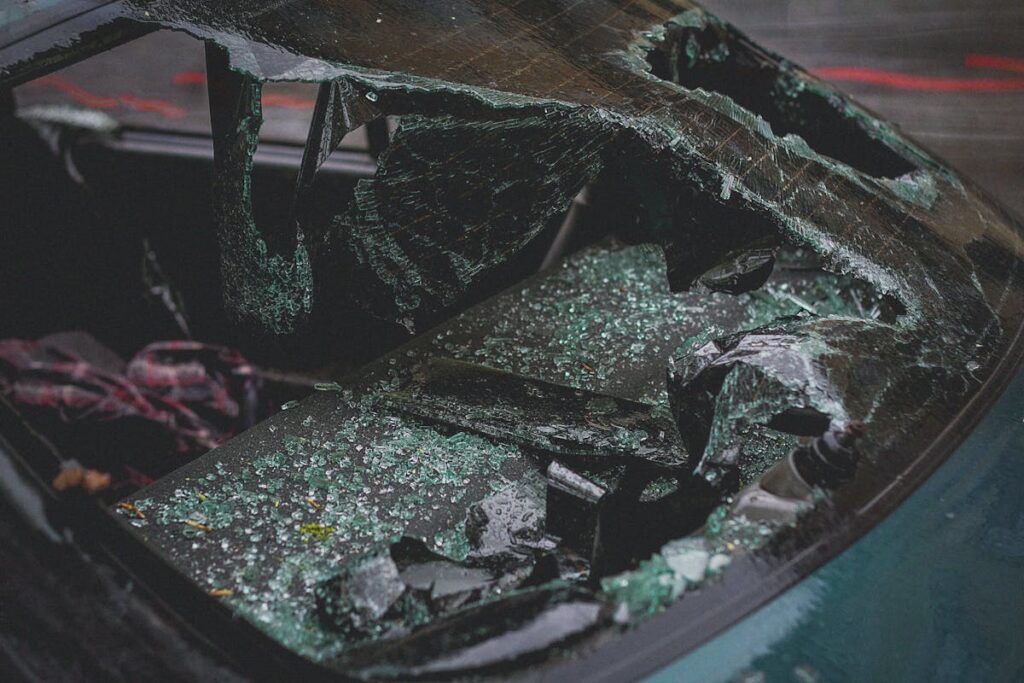In the aftermath of a car accident, individuals frequently make missteps that compromise their legal and health outcomes. Common pitfalls include neglecting to seek immediate medical attention and failing to contact law enforcement to file a report. Admitting fault too early or rushing into an insurance settlement can further complicate matters. Many overlook the importance of documenting the scene and gathering witness information, vital actions that protect rights and guarantee fair compensation. What’s often overlooked?
Failing to Check for Injuries
Why is it essential to assess injuries immediately after a car accident? Swift injury assessment is critical to safeguard one’s legal standing and health. When individuals fail to check for injuries promptly, they risk exacerbating physical harm and complicating any future legal claims. Undetected injuries might later manifest, making it difficult to establish causation, which is fundamental in personal injury cases. Furthermore, the emotional impact of an accident can cloud judgment, leading victims to underestimate their injuries. Legal experts stress that a thorough assessment guarantees timely medical intervention and preserves evidence necessary for potential claims. By prioritizing prompt injury assessment, individuals protect their well-being and strengthen their legal position, assuring they receive the compensation they deserve for any sustained injuries.
Not Contacting the Police
Failing to contact the police after a car accident can greatly undermine any subsequent legal proceedings and insurance claims. A police report serves as an impartial account of the incident, essential for establishing facts and assigning liability. Without it, individuals may face significant challenges in proving their version of events, especially if disputes arise. Legal implications of neglecting this step include weakened defense in litigation and potential denial of insurance claims. Insurers often rely on a police report to process claims efficiently and determine fault. Therefore, contacting the police is indispensable for safeguarding one’s legal interests and ensuring all parties adhere to the law. Promptly making this call not only fulfills a legal obligation but also protects the interests of all involved.
Neglecting to Document the Scene
Neglecting to document the scene of a car accident can greatly hinder the ability to establish essential evidence in subsequent legal and insurance processes. Proper scene documentation serves as an indispensable tool for accurately reconstructing events, supporting claims, and validating accounts. Photographic evidence, specifically, offers objective clarity that verbal testimonies may lack. Capturing images of vehicle positions, road conditions, traffic signals, and visible damages guarantees that all relevant details are preserved. Without such documentation, parties may face challenges in proving fault or substantiating insurance claims, potentially resulting in unfavorable outcomes. Legal professionals frequently emphasize the importance of prompt, thorough scene documentation to safeguard clients’ rights. Ultimately, neglecting this critical step can lead to complications and undermine the integrity of a case.
Admitting Fault at the Scene
While thorough documentation is foundational to building a solid case, one’s conduct at the scene of an accident is equally significant. An immediate, perhaps instinctual, apology or admission of fault can have far-reaching admission consequences. Such statements, though made with good intentions, may inadvertently affect the legal proceedings and potentially compromise one’s position. Fault implications don’t just rest on immediate verbal exchanges; they are a critical aspect of insurance evaluations and legal determinations. Consequently, it is prudent for individuals involved in an accident to exercise restraint in their communications. Instead of offering admissions, focusing on exchanging contact and insurance information is advisable. Consulting with legal counsel before making any statements guarantees one’s rights and interests remain protected throughout the process.
Not Gathering Witness Information
Failing to gather witness information at the scene of a car accident can greatly undermine a victim’s ability to substantiate their claims. Witnesses provide critical, objective accounts that can corroborate a party’s version of events, which is pivotal when disputes arise. Without this invaluable testimony, the likelihood of facing unfavorable legal outcomes increases, potentially complicating the path to a fair settlement or judgment.
Importance of Witness Details
Why is gathering witness information after a car accident so important? Witness details are essential in establishing the sequence of events and determining fault. Witness credibility plays a key role in the legitimacy of a claim, as unbiased accounts can greatly influence legal outcomes. Collecting witness statements promptly guarantees that the details are fresh, accurate, and less prone to distortion over time. These statements serve as critical evidence, reinforcing the injured party’s position and aiding insurance claims or court proceedings. Legal professionals stress the importance of immediate action in securing this information. A well-documented witness account can be the deciding factor in a case, providing clarity and supporting a client’s right to compensation. As a result, gathering witness details is indispensable in the aftermath of an accident.

Consequences of Missing Information
Neglecting to gather witness information after a car accident can considerably undermine a victim’s pursuit of justice. Witnesses provide unbiased accounts that are essential in reconstructing events and establishing fault. Missing details from witnesses can lead to significant legal repercussions, weakening a victim’s case and diminishing their chances of receiving fair compensation. Without the corroboration of witness statements, insurance companies may dispute claims or offer inadequate settlements, leaving victims to shoulder financial burdens. Additionally, in court, the absence of independent testimonies can result in prolonged litigation or unfavorable outcomes, as evidence becomes limited to the parties involved. To guarantee a robust legal standing, it is imperative for accident victims to promptly collect and preserve witness information, thereby safeguarding their right to justice.
Forgetting to Notify Your Insurance Company
In the aftermath of a car accident, promptly notifying one’s insurance company is essential to safeguarding policy coverage and ensuring a smooth claims process. Failure to do so can result in denied claims or reduced benefits, as many insurance policies require immediate reporting of incidents. By understanding the importance of timely notification, individuals can better protect their interests and avoid unnecessary complications.
Timely Insurance Notification
Regularly overlooked, timely notification to your insurance company after a car accident is essential for protecting your legal rights and ensuring proper coverage. Insurance policies often contain specific deadlines for reporting incidents, and failing to adhere to these timeframes can jeopardize a claim. By promptly informing the insurer, individuals safeguard their position within the policy’s terms, mitigating risks of claim denial or reduced compensation.
A delay in communication may lead to complications, as insurers require immediate incident details to evaluate the situation accurately. Legal experts emphasize the importance of understanding policy requirements and acting swiftly. In practice, ensuring timely notification aligns with contractual obligations and demonstrates due diligence, reinforcing one’s position in any subsequent claims process. Such proactive measures are vital for maintaining thorough coverage.
Policy Coverage Awareness
While timely notification to the insurance company addresses the immediacy of a car accident, being fully aware of one’s policy coverage is equally significant. Many individuals overlook the importance of understanding their coverage limits and policy exclusions, which may lead to unexpected financial burdens. The fine print in an insurance policy often contains exclusions that could deny coverage for certain damages or scenarios. Consequently, policyholders should meticulously review their policy documents and clarify any ambiguities with their insurance agent. Being proactive in understanding these aspects not only prepares individuals for potential claims but also guarantees they are adequately protected. A well-informed policyholder can make strategic decisions post-accident, avoiding costly pitfalls that arise from inadequate coverage or misunderstood exclusions.
Ignoring Medical Attention
Despite the adrenaline and confusion that often follow a car accident, seeking prompt medical attention is an essential step that should not be overlooked. A thorough medical evaluation immediately after the incident can identify injuries that may not be apparent due to shock or stress. Ignoring this step can lead to long term effects that compromise health and complicate future legal claims. Insurance companies may question the legitimacy of injuries if medical documentation is absent or delayed. Legal experts stress the importance of preserving both health and the integrity of any potential claims by promptly attending to medical needs. Clients must understand that safeguarding their wellbeing is paramount, and documenting injuries serves as vital evidence should litigation become necessary.
Underestimating Vehicle Damage
Underestimating vehicle damage can have significant repercussions for those involved in a car accident. Properly evaluating damage is essential to guarantee that all necessary repairs are identified, preventing further complications and expenses. Often, individuals may assume the visible damage is minimal, overlooking potential underlying structural issues. This oversight can lead to underestimating repairs, resulting in inadequate compensation from insurance claims. Additionally, improperly repaired vehicles may pose safety risks to occupants and other road users. It is imperative for accident victims to seek professional evaluations from qualified mechanics or collision experts. These assessments provide thorough insights, ensuring accurate repair estimates and advocating for rightful compensation. Legal advisors emphasize the importance of meticulous documentation and expert opinions to protect clients’ interests effectively.
Accepting Quick Settlement Offers
Accepting a quick settlement offer can be a common pitfall for individuals involved in a car accident. Insurance companies often exert settlement pressure, urging victims to agree to a payout swiftly. This tactic can leave individuals with insufficient compensation for their actual damages. Without the guidance of legal representation, victims may not fully understand the extent of their rights or the fair value of their claims. A skilled attorney can assess the situation, negotiate with insurers, and guarantee clients receive appropriate compensation. Quick settlements may seem appealing to resolve matters promptly, but they often overlook long-term considerations, such as ongoing medical expenses and lost wages. Seeking professional legal advice is essential to avoid settling for less than what one deserves.
Frequently Asked Questions
What Should I Do if the Other Driver Flees the Scene?
Upon encountering a hit and run, the individual should promptly document details, contact authorities, and explore legal options. Consulting a legal expert guarantees thorough understanding of rights and potential compensation avenues, safeguarding their interests effectively.
How Can I Obtain a Copy of the Police Report?
To obtain a police report, one should understand timelines and how to request it. Contact the relevant police department, submit any required forms, and be aware of processing times to guarantee timely access to important information.
What Are My Rights if the Other Driver Is Uninsured?
When dealing with an uninsured motorist, understanding one’s legal options is essential. The victim may pursue compensation through their insurance, particularly if they have uninsured motorist coverage, or potentially file a lawsuit against the driver.
How Do I Handle a Rental Car After an Accident?
When managing a rental car post-accident, one should review rental car insurance coverage to mitigate costs. Address potential rental car fees by consulting the rental agreement and ensuring timely communication with the rental company for a seamless resolution.
Can I File a Claim if the Accident Happened on Private Property?
Yes, individuals can file a claim for accidents on private property. Insurance coverage typically extends to such incidents. It’s essential to report the accident promptly, providing detailed documentation to guarantee a smooth claims process.

